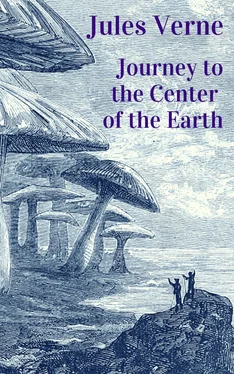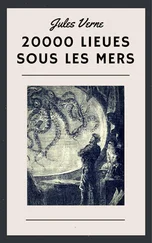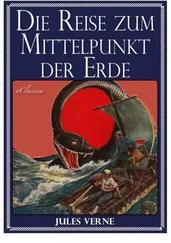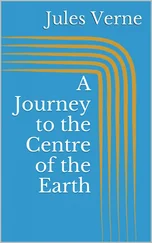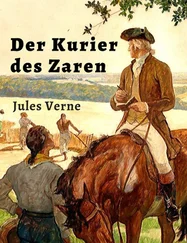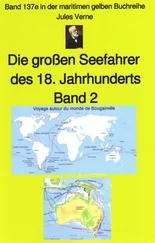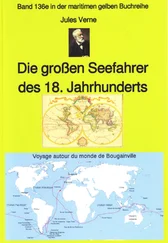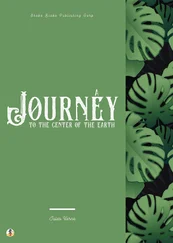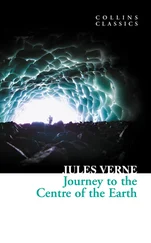To tell the plain truth, I pitied him. In spite of the reproaches which I considered I had a right to lay upon him, a certain feeling of compassion was beginning to gain upon me. The poor man was so entirely taken up with his one idea that he had even forgotten how to get angry. All the strength of his feelings was concentrated upon one point alone; and as their usual vent was closed, it was to be feared lest extreme tension should give rise to an explosion sooner or later.
I might with a word have loosened the screw of the steel vise that was crushing his brain; but that word I would not speak.
Yet I was not an ill-natured fellow. Why was I dumb at such a crisis? Why so insensible to my uncle’s interests?
“No, no,” I repeated, “I shall not speak. He would insist upon going; nothing on earth could stop him. His imagination is a volcano, and to do that which other geologists have never done he would risk his life. I will preserve silence. I will keep the secret which mere chance has revealed to me. To discover it, would be to kill Professor Liedenbrock! Let him find it out himself if he can. I will never have it laid to my door that I led him to his destruction.”
Having formed this resolution, I folded my arms and waited. But I had not reckoned upon one little incident that turned up a few hours later.
When our good Martha wanted to go to market, she found the door locked. The big key was gone. Who could have taken it out? Assuredly, it was my uncle, when he returned the night before from his hurried walk.
Was this done on purpose? Or was it a mistake? Did he want to reduce us by famine? This seemed like going rather too far! What! should Martha and I be victims of a position of things in which we had not the slightest interest? It was a fact that a few years before this, while my uncle was working at his great classification of minerals, he went forty-eight hours without eating, and all his household was obliged to share in this scientific fast. As for me, what I remember is that I got severe cramps in my stomach, which hardly suited the constitution of a hungry, growing lad.
Now it appeared to me as if breakfast was going to be wanting, just as supper had been the night before. Yet I resolved to be a hero, and not to be conquered by the pangs of hunger. Martha took it very seriously, and, poor woman, was very much distressed. As for me, the impossibility of leaving the house distressed me a good deal more, and for a very good reason. A caged lover’s feelings may easily be imagined.
My uncle went on working, his imagination went off rambling into the ideal world of combinations; he was far away from earth, and really far away from earthly wants.
About noon hunger began to stimulate me severely. Martha had, without thinking any harm, cleared out the larder the night before, so that now there was nothing left in the house. Still I held out; I made it a point of honor.
Two o’clock struck. This was becoming ridiculous; worse than that, unbearable. I began to say to myself that I was exaggerating the importance of the document; that my uncle would surely not believe in it, that he would set it down as a mere puzzle; that if it came to the worst, we should lay violent hands on him and keep him at home if he thought of venturing on the expedition; that, after all, he might himself discover the key of the cipher, and that then I should be clear at the mere expense of my involuntary abstinence.
These reasons seemed excellent to me, though on the night before I should have rejected them with indignation; I even went so far as to condemn myself for my absurdity in having waited so long, and I finally resolved to let it all out.
I was therefore meditating a proper introduction to the matter, so as not to seem too abrupt, when the Professor jumped up, clapped on his hat, and prepared to go out.
Surely he was not going out, to shut us in again! no, never!
“Uncle!” I cried.
He seemed not to hear me.
“Uncle Liedenbrock!” I cried, lifting up my voice.
“Aye,” he answered like a man suddenly waking.
“Uncle, that key!”
“What key? The door key?”
“No, no!” I cried. “The key of the document.”
The Professor stared at me over his spectacles; no doubt he saw something unusual in my countenance; for he laid hold of my arm, and speechlessly questioned me with his eyes. Yes, never was a question more forcibly put.
I nodded my head up and down.
He shook his pityingly, as if he was dealing with a lunatic. I gave a more affirmative gesture.
His eyes glistened and sparkled with live fire, his hand shook threateningly.
This mute conversation at such a momentous crisis would have riveted the attention of the most indifferent. And the fact really was that I dared not speak now, so intense was the excitement for fear lest my uncle should smother me in his first joyful embraces. But he became so urgent that I was at last compelled to answer.
“Yes, that key, chance—”
“What is that you are saying?” he shouted with indescribable emotion.
“There, read that!” I said, presenting a sheet of paper on which I had written.
“But there is nothing in this,” he answered, crumpling up the paper.
“No, nothing until you proceed to read from the end to the beginning.”
I had not finished my sentence when the Professor broke out into a cry, nay, a roar. A new revelation burst in upon him. He was transformed!
“Aha, clever Saknussemm!” he cried. “You had first written out your sentence the wrong way.”
And darting upon the paper, with eyes bedimmed, and voice choked with emotion, he read the whole document from the last letter to the first.
It was conceived in the following terms:
In Sneffels Joculis craterem quem delibat
Umbra Scartaris Julii intra calendas descende,
Audax viator, et terrestre centrum attinges.
Quod feci, Arne Saknussemm.
Which bad Latin may be translated thus:
“Descend, bold traveler, into the crater of the jokul of Sneffels, which the shadow of Scartaris touches before the calends of July, and you will attain the center of the earth. Which I have done, Arne Saknussemm.”
In reading this, my uncle gave a spring as if he had touched a Leyden jar. His audacity, his joy, and his convictions were magnificent to behold. He came and he went; he seized his head between both his hands; he pushed the chairs out of their places, he piled up his books; incredible as it may seem, he rattled his precious nodules of flints together; he sent a kick here, a thump there. At last his nerves calmed down, and like a man exhausted by too lavish an expenditure of vital power, he sank back exhausted into his armchair.
“What o’clock is it?” he asked after a few moments of silence.
“Three o’clock,” I replied.
“Is it really? The dinner hour is past, and I did not know it. I am half-dead with hunger. Come on, and after dinner—”
“Well?”
“After dinner, pack up my trunk.”
“What?” I cried.
“And yours!” replied the indefatigable Professor, entering the dining room.
CHAPTER 6: Exciting Discussions about an Unparalleled Enterprise
At these words a cold shiver ran through me. Yet I controlled myself; I even resolved to put a good face upon it. Scientific arguments alone could have any weight with Professor Liedenbrock. Now there were good ones against the practicability of such a journey. Penetrate to the center of the earth! What nonsense! But I kept my dialectic battery in reserve for a suitable opportunity, and I interested myself in the prospect of my dinner, which was not yet forthcoming.
It is no use to tell of the rage and imprecations of my uncle before the empty table. Explanations were given, Martha was set at liberty, ran off to the market, and did her part so well that in an hour afterwards my hunger was appeased, and I was able to return to the contemplation of the gravity of the situation.
Читать дальше
